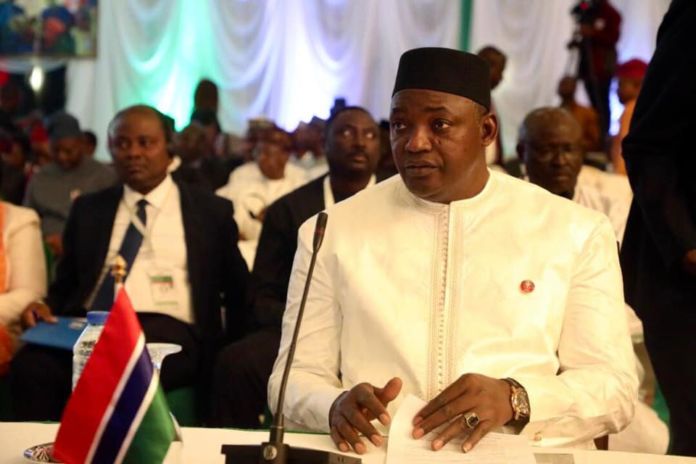Put simply, corruption is the abuse of entrusted power for private gain. It comes in many forms, including public servants taking money or favours in exchange for services. In The Gambia, it involves politicians misusing public money or granting public jobs and contracts to their families & friends.
Corruption can happen anywhere: in business, government, the courts, the media, and in civil society, as well as across all sectors from health and education to infrastructure and sports. Participants involve anyone: politicians, government officials, public servants, business people or members of the public. Corruption occurs in the shadows with the help of enablers such as bankers, lawyers, accountants, real estate agents and opaque financial systems that allow the corrupt to hide their loot.
Under president Barrow’s government, the rising incidence of corruption scandals has helped to erode trust, weaken democracy, hamper economic development and further exacerbates inequality, poverty and environmental crisis. Exposing corruption and holding the corrupt to account can only happen if we understand the way it works and the systems that enable it: In January 2017, barely four weeks in office for the coalition govt, the managing director of Gambia Revenue Authority, Yankuba Darboe, was the first to burst in a ploy to be in president Barrow’s good books. It involves GRA without ask or need using collected tax revenue to purchase two brand new cars for the presidency. The resultant public outcry led to the said cars being handed over to GRTS. But it didn’t stop there – our problems only just began.
Weeks later, scandal broke out at GAMTEL where the leadership paid lip-service to leakage and waste in the [infamous] call termination sim card scandal. A senior government official told me at the time that the parastatal was losing one million dalasi (D1,000,000) every week amid the furore. The amazing thing, how cowardly, was the total lack of respect to rules & protocol by then management never cared to brief parliament and the press on the crisis. A lot of money was lost during that three month stretch; many had gotten rich in a most daylight robbery of the Gambian people – again, no police probe, nor any legal action against the culprits.
Next stop NAWEC – billions of dalasi was stolen from the national electricity and water carrier by former president Jammeh & his acolytes.
Shares were sold and resold, accompanied by millions in dividend payments without any (public) announcements. So, what is the fate of the cartel today? Has remedial measures flagged up by the Janneh Commission pertaining to the issue implemented? Despite the dark days of old, hope still reside on the vision & reform agenda under the new director general, Alpha Robinson.
To much appreciation – The EU Banjul office continues to work hard mobilising millions of euros to help stabilise the economy. The operational niceties on small scale development projects under fund for this new turn of events, although a slow burner in terms of job numbers, indeed is a welcome development. But even whereas funding came in the form of budgetary support on external debt, import cover has been enhanced. From the get go, ambassador Lagos has been instrumental, except for lack of foresight and ambition from the government.
Writing from a public-opinion perspective, one is at a loss as to naked corruption by the spineless bunch residing at the Department of Health. It has become ever apparent why The Gambia continues to fail against development set targets. Where is the police commissioner in all this to effect arrest on a most white collar crime?! You would think that our society and politics rotates on the idea that we are all in this together – utilitarian values so to speak – reflected in the goodness of a people powered government. Lack of transparency necessitate institutionalization of an independent anti-corruption Commission as a matter of urgency.
What concerns most is the implementation phase of the Janneh Commission report or the lack thereof. The advent of COVID-19 has succeeded to distract us off an adhoc set up by parliament, yet parliament seem so powerless to act upon its findings?! The National Assembly has to challenge & summon the Commissioners, show strong teeth impose its will on the Justice ministry. The ‘House’ still has the power to summon the president for questioning if ministers fail to provide satisfactory responses on critical issues concerning the status of seized monies, assets, cars, houses, and lands.
The blame, for now at least, shall apportion at the feet of a timid National Audit Office ( N.A.O), whom by the way one had heaped praise just recently. Its leaders ought to know that exception to the rule should NOT exist as far as remit or investigative reach is concerned, to include budgetary spending lines across the executive branch. While it is true that standards have slipped as opposed to what obtained in the Jawara era with respect to rules & regulations, do not be despondent.
Gambians should be reassured that most civil servants are morally good, ethically upright. Critics shouldn’t rush to paint the entire stream with the same paint brush, but for a spoilt rotten few, selfish as ever.
Under president Barrow’s leadership, the law has failed to prosecute blatant corruption cases, to have emboldened the appetite of would-be thieves ever too ready to profit on the taxpayer. The million dalasi question worth ask is why is the president still refusing to speak UP condemn corruption in his administration???
The writer, Gibril Saine, is based in the United Kingdom




